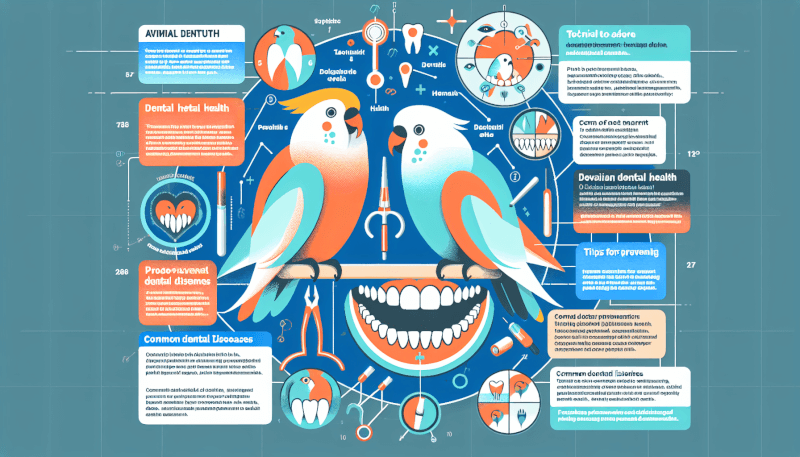Avian dental health is an often overlooked aspect of bird care, but it is crucial for their overall well-being. Just like humans, birds can also suffer from dental problems that can cause discomfort and affect their ability to eat and communicate. In this article, we will explore some key considerations for maintaining optimal dental health in our feathered friends. From understanding the signs of dental issues to implementing preventive measures, these tips will help you keep your avian companion’s beak in tip-top condition.
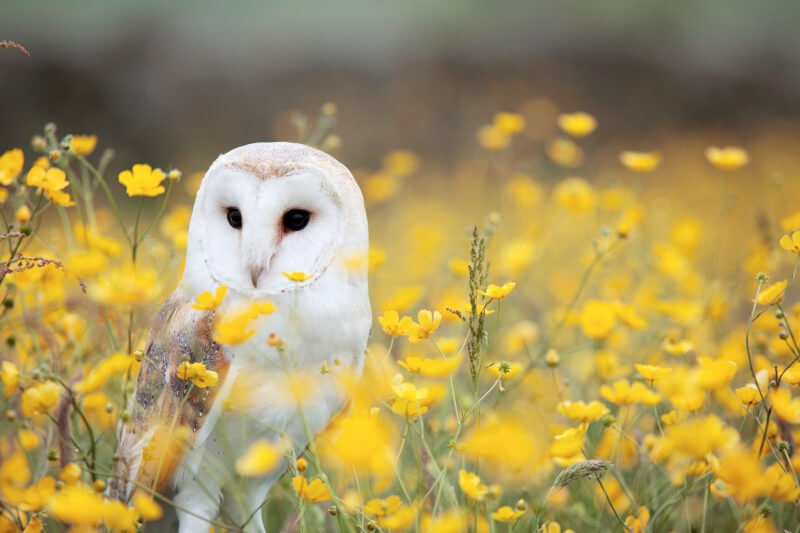
Diet and Nutrition
Balanced Diet
Maintaining a balanced diet is crucial for your bird’s overall health, including their dental health. A balanced diet ensures that your bird receives all the necessary nutrients, vitamins, and minerals they need for healthy teeth and oral tissues. It should consist of a variety of fresh fruits, vegetables, quality pellets, seeds, and grains. This combination of foods will provide the necessary calcium, which is essential for strong beak and teeth development.
Avoidance of Processed Foods
Processed foods often lack the essential nutrients your bird needs for optimal dental health. These foods are typically high in sugar, salt, and unhealthy fats, which can lead to tooth decay and other dental issues. It is best to avoid processed or sugary foods like candies, chips, and sweetened beverages. Instead, focus on providing your bird with fresh, whole foods that are rich in nutrients.
Supplementing with Calcium
Calcium is vital for strong beak and teeth development in birds. While many food sources provide calcium naturally, it is sometimes necessary to offer additional sources as supplements. Talk to your avian veterinarian about the appropriate calcium supplement for your bird’s species and age. Calcium supplements can come in the form of cuttlebones or calcium blocks, which can be placed in the cage for your bird to gnaw on.
Avoidance of Toxic Foods
Certain foods are not only harmful to birds’ overall health but also specifically to their dental health. These toxic foods should be completely avoided to prevent potential dental problems. Avocado, chocolate, onion, and garlic are all highly toxic to birds and can cause serious health issues if ingested. Additionally, caffeine should be strictly avoided, as it can negatively impact a bird’s nervous system. Always ensure that your bird’s environment is free from these toxic food items.
Good Oral Hygiene
Regular Beak Trimming
Beak trimming plays a crucial role in maintaining good oral hygiene in birds. Overgrown beaks can lead to various dental issues, including malocclusion and discomfort while eating. Regular beak trimming helps to ensure the beak remains properly aligned, allowing for proper eating and chewing. It is recommended to consult a professional avian veterinarian or experienced bird groomer for beak trimming, as it requires specific knowledge and tools to be done safely.
Brushing Teeth
While birds do not have teeth like mammals, their beaks and oral tissues still require regular cleaning to prevent the buildup of bacteria and food debris. Gentle brushing of your bird’s beak using a soft-bristled toothbrush designed for birds can help maintain good oral hygiene. Use warm water or an avian-safe tooth gel recommended by your veterinarian. Regular brushing should be done at least once a week, but it is important to remember that birds have delicate tissues, so be gentle.
Proper Grooming Tools
When it comes to maintaining good oral hygiene, having the right grooming tools is essential. Alongside a soft-bristled toothbrush, other useful tools include bird-safe dental picks, cotton swabs, and gauze pads. These tools can help you remove any food debris or plaque that may have accumulated on your bird’s beak or oral tissues. However, always exercise caution and ensure you don’t apply excessive pressure or cause any discomfort to your bird during grooming.
Importance of Chewing Toys
Chewing toys are not just a form of entertainment for your bird; they also serve an essential role in maintaining good oral health. Providing a variety of safe and bird-appropriate chewing toys can help satisfy your bird’s natural chewing instincts. Chewing on toys helps strengthen jaw muscles, prevent boredom and stress, and maintain beak health. Opt for toys made of safe materials like natural wood, using safe dyes or pigments, and avoid toys with small parts that could potentially be swallowed.
Regular Veterinary Check-ups
Importance of Check-ups
Regular check-ups with an avian veterinarian are crucial for maintaining your bird’s dental health. Dental issues in birds can often go unnoticed as they may not show obvious signs of discomfort or pain. Regular veterinary check-ups allow for early detection and prevention of potential dental problems. A knowledgeable avian veterinarian can thoroughly examine your bird’s oral cavity, identify any issues, and provide appropriate treatment or recommendations to maintain optimal dental health.
Frequency of Check-ups
The frequency of veterinary check-ups for your bird’s dental health will depend on various factors, including their species, age, and overall health. As a general guideline, it is recommended to have a comprehensive veterinary check-up at least once a year for a healthy bird. However, for older birds or those with pre-existing health conditions, more frequent check-ups may be necessary. Consult with your avian veterinarian to determine the appropriate check-up schedule for your feathered friend.
Identification of Dental Issues
During a veterinary check-up, your avian veterinarian will carefully examine your bird’s oral cavity and look for any signs of dental issues. They will check for overgrown beaks, malocclusion, tooth decay, or signs of periodontal disease. Using specialized tools and their expertise, the veterinarian can identify any abnormalities or potential problems that may require further attention.
Treatment Options
If your bird is diagnosed with a dental issue during a check-up, your avian veterinarian will discuss appropriate treatment options with you. The treatment will depend on the specific dental problem and may include procedures such as beak filing, tooth extraction, dental scaling and polishing, or even root canal procedures. Your veterinarian will explain the details of the treatment plan, possible risks involved, and aftercare instructions to ensure your bird’s optimal dental health.
Signs of Dental Problems
Changes in Eating Habits
One of the key signs of dental problems in birds is a noticeable change in eating habits. If your bird starts to show reluctance or difficulty while eating, it may indicate an underlying dental issue. Watch out for changes in appetite, struggling to bite or chew food, or dropping food more frequently.
Loss of Appetite
Dental problems can often result in discomfort or pain while eating, leading to a loss of appetite in birds. If you notice a significant decrease in your bird’s food consumption or a sudden refusal to eat, it is essential to consider the possibility of dental issues and seek veterinary attention promptly. Persistent loss of appetite can eventually lead to malnutrition and other health problems.
Visible Discomfort
Pay attention to any signs of visible discomfort your bird may exhibit. This can include rubbing or pawing at the face, excessive beak rubbing against perches or objects, or vocalizing in distress. These behaviors may indicate that your bird is experiencing pain or discomfort in their oral cavity and should not be overlooked.
Behavioral Changes
Dental problems can impact your bird’s overall behavior and personality. If you notice any sudden changes in your bird’s behavior, such as increased irritability, aggression, or a lack of energy, it could be a sign of underlying dental issues. Birds in pain or discomfort may exhibit behavioral changes as they try to cope with the discomfort they are experiencing. Consulting with your avian veterinarian can help identify and address these potential dental concerns.
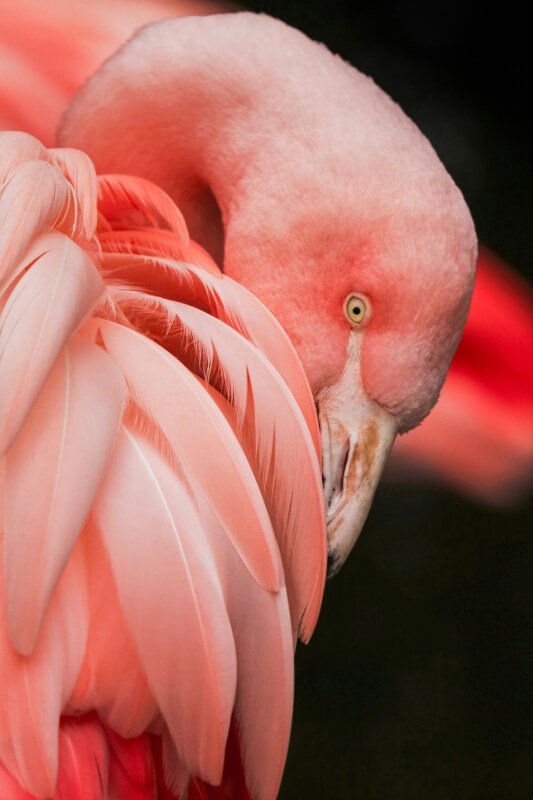
Potential Dental Issues
Beak Overgrowth
Beak overgrowth occurs when the beak grows longer than normal and can interfere with a bird’s ability to eat and groom properly. This dental issue can be caused by malnutrition, lack of proper chewing opportunities, or genetic factors. Regular beak trimming can help prevent and manage beak overgrowth, ensuring your bird’s beak remains at a healthy length.
Malocclusion
Malocclusion refers to an abnormal alignment of the upper and lower beak, resulting in incorrect closing and grinding of the beak surfaces. It can cause difficulty in eating, discomfort, and wear patterns on the beak. Malocclusion can sometimes be hereditary or develop due to trauma or injury. Prompt veterinary attention and appropriate treatment are vital to prevent further oral complications.
Tooth Decay
Although birds do not have teeth, tooth decay can occur in the exposed pulp cavity of the beak. This decay can result from trauma, bacterial infections, or poor diets high in sugar or acidic foods. Good oral hygiene practices and a balanced diet can help reduce the risk of tooth decay in birds.
Periodontal Disease
Periodontal disease is an inflammatory condition that affects the tissues surrounding the teeth and can lead to tooth loss if left untreated. It is often caused by the buildup of bacteria and plaque on the beak surface. Regular oral care and veterinary check-ups can help prevent and manage periodontal disease in birds.
Preventative Measures
Proper Diet and Nutrition
Ensuring your bird receives a proper diet and nutrition plays a vital role in preventing dental issues. Provide a well-balanced diet that includes fresh fruits, vegetables, quality pellets, seeds, and grains. These foods will provide the necessary nutrients for healthy beak and teeth development, reducing the risk of dental problems.
Regular Oral Care
Regular oral care is key to maintaining good dental health in birds. This includes gentle brushing of the beak with a soft-bristled toothbrush, providing chewing toys to stimulate jaw muscles, and periodically inspecting the beak and oral cavity for any signs of abnormality or plaque buildup. Establish a routine of oral care for your bird to promote optimal oral hygiene.
Avoidance of Dangerous Objects
Birds are naturally curious and prone to exploring their environment through chewing. It is essential to remove any dangerous objects from their vicinity that could potentially harm their oral health. This includes items like small toys, sharp or abrasive materials, and toxic substances that could cause injury or lead to dental problems if ingested.
Providing Chewing Opportunities
To satisfy your bird’s natural chewing instincts and promote good oral health, provide a variety of safe and bird-appropriate chewing opportunities. Toys made of natural wood, soft pinecones, or natural fiber ropes can provide the necessary chewing stimulation while also preventing boredom and stress. Regularly inspect and replace chew toys as needed to maintain their effectiveness.
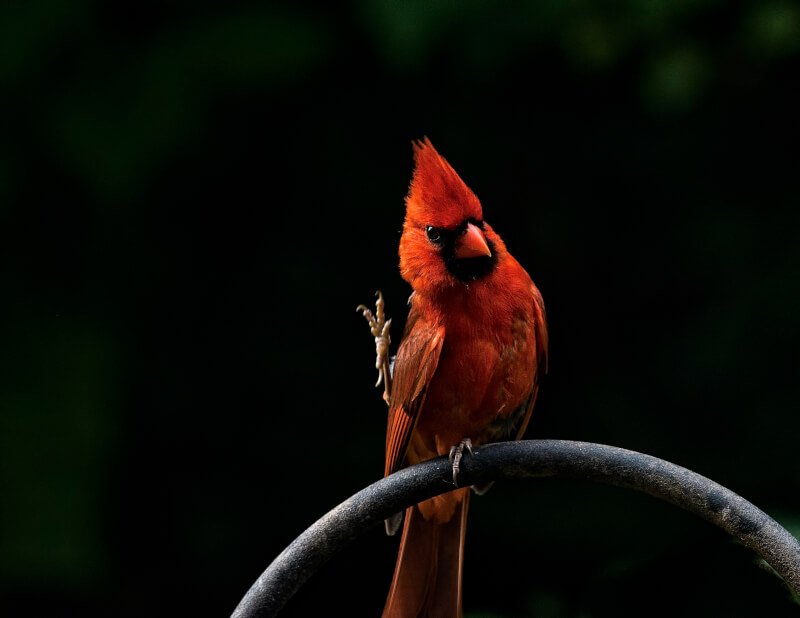
Importance of Chewing
Natural Beak Maintenance
Chewing is essential for birds as it helps with natural beak maintenance. Birds’ beaks grow continuously, just like our nails, and require regular wear to prevent overgrowth. The repetitive motion of chewing on toys and safe objects aids in naturally shaping and wearing down the beak, ensuring it remains properly aligned and functional.
Stimulating Jaw Muscles
Chewing on toys and safe objects not only promotes beak health but also helps to stimulate the jaw muscles in birds. These muscles play a vital role in proper beak function and overall oral health. Regular chewing exercises help keep the jaw muscles strong and prevent muscle weakness or atrophy.
Preventing Boredom and Stress
Chewing is an instinctive behavior for birds and serves as a form of mental and physical stimulation. Offering a variety of chewing opportunities helps prevent boredom and stress, which can have negative impacts on a bird’s overall well-being. By providing appropriate chew toys, you can keep your bird entertained, engaged, and mentally stimulated.
Preventing Beak Disorders
Regular chewing activities help prevent beak disorders, such as overgrowth or malocclusion. By encouraging your bird to chew on various toys and safe objects, you are promoting a natural beak shape and preventing potential dental issues. Beak disorders can cause discomfort, difficulty eating, and difficulty grooming, so it is crucial to incorporate chewing opportunities into your bird’s daily routine.
Beak Trimming Techniques
Professional Trimming
Beak trimming is a delicate procedure that should ideally be performed by a professional avian veterinarian or experienced bird groomer. These experts have the necessary knowledge, skills, and tools to perform beak trimming safely and effectively. They will be able to assess the beak’s length, alignment, and overall condition and provide appropriate trimming to maintain optimal oral health.
Do-It-Yourself Trimming
While professional trimming is recommended, some bird owners may choose to perform beak trimming themselves. If you decide to take on this task, it is crucial to educate yourself thoroughly on the proper techniques and ensure you are confident in your abilities. Use specialized bird grooming tools such as a beak trimmer or nail clippers, following recommended guidelines and exercising extreme caution to prevent any harm to your feathered friend.
Tools and Techniques
For beak trimming, specific tools designed for birds should be used. These tools can include beak trimmers, nail clippers, or even a specialized dremel tool with a sanding attachment. Always use sharp, clean tools to achieve a precise and smooth cut. It is important to familiarize yourself with proper techniques, including the correct angles and depth for trimming, to avoid any accidental injuries.
Safety Considerations
Beak trimming requires careful attention to safety to prevent any harm to your bird. It is essential to be calm, patient, and gentle while performing the trimming process. Ensure that your bird is securely restrained to prevent any sudden movements that could cause injury. Keep styptic powder or cornstarch on hand to stop any potential bleeding, and be prepared to seek professional assistance if you encounter difficulties or feel unsure about the procedure.
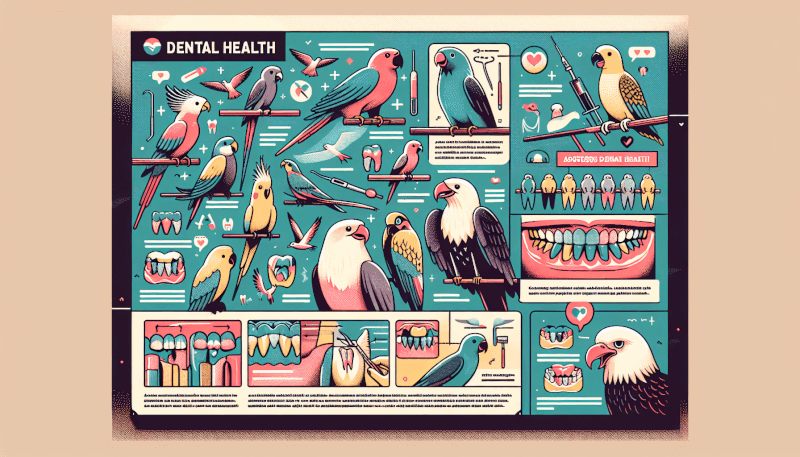
Toxic Foods for Birds
Avocado
Avocado is highly toxic to birds and should never be fed to them. The persin, a substance found in avocados, can cause severe health issues, including cardiac distress and respiratory problems, if ingested by birds. Avoid feeding your bird any part of the avocado, including the fruit, pit, and skin.
Chocolate
Chocolate contains theobromine, a chemical compound that is toxic to birds and can cause digestive issues, seizures, and even fatal consequences if ingested. It is important to keep any products containing chocolate, including candies, cakes, and cookies, out of reach of your bird.
Onion and Garlic
Onions and garlic contain compounds that can damage a bird’s red blood cells and lead to anemia. Both raw and cooked onions and garlic should be strictly avoided in their diet. Be cautious when preparing meals for yourself or your family, as even small amounts of these ingredients can be harmful to your bird if accidentally ingested.
Caffeine
Caffeine, found in coffee, tea, energy drinks, and other caffeinated beverages, is toxic to birds. Consumption of caffeine can negatively impact a bird’s nervous system, leading to tremors, rapid heartbeat, and even death. Keep all caffeinated products away from your bird’s reach to prevent any accidental ingestion.
Common Dental Treatments
Beak Filing
Beak filing is a dental treatment that involves filing or grinding down the beak’s surfaces to correct any abnormalities, overgrowth, or malocclusion. The procedure is typically performed by a professional avian veterinarian using specialized tools. Beak filing helps maintain a healthy beak length and alignment, ensuring proper eating, and preventing future dental complications.
Tooth Extraction
In severe cases of dental disease or irreparable tooth damage, tooth extraction may be necessary. This procedure involves the removal of affected or damaged teeth to prevent further pain, infection, and complications. Tooth extraction should only be performed by a qualified avian veterinarian to ensure the procedure is done safely and with minimal discomfort for the bird.
Dental Scaling and Polishing
Dental scaling and polishing are common dental procedures used to remove plaque, tartar, and other dental deposits from the beak surface. These deposits can harbor bacteria and contribute to periodontal disease if left untreated. Scaling involves the careful removal of these deposits, followed by polishing to smooth the beak’s surface. These procedures are usually performed under anesthesia by a skilled avian veterinarian.
Root Canal Procedures
In cases where a bird’s tooth is severely damaged or infected, a root canal procedure may be considered. This procedure involves removing the infected pulp from the tooth and filling it with a biocompatible material to seal the tooth root. Root canals are complex and delicate procedures that require advanced knowledge and skills in avian dentistry, and should only be performed by experienced avian veterinarians.
In conclusion, maintaining good dental health is essential for your bird’s overall well-being. By following a balanced diet, avoiding processed and toxic foods, and providing regular oral care, you can significantly reduce the risk of dental issues. Regular veterinary check-ups will help identify any potential dental problems early on, ensuring prompt treatment and prevention of further complications. Remember, your friendly efforts in caring for your bird’s dental health will contribute to a happy and healthy companion for years to come.


